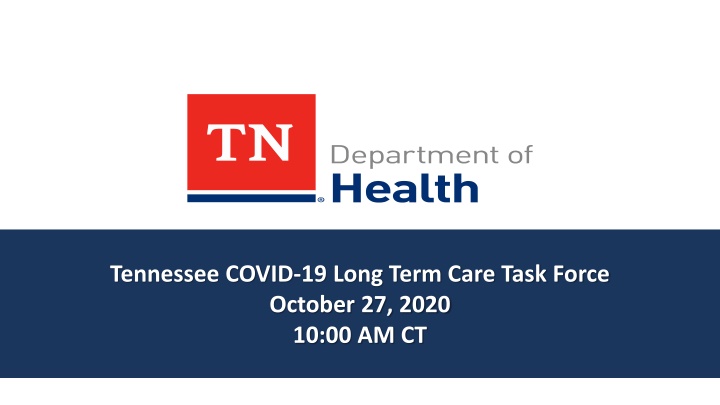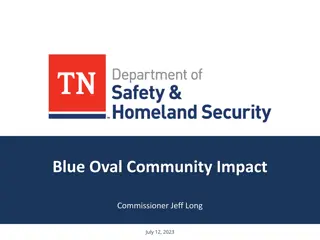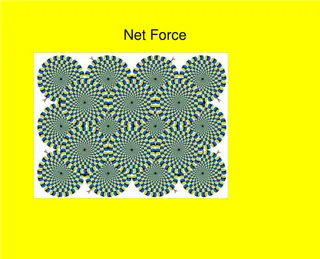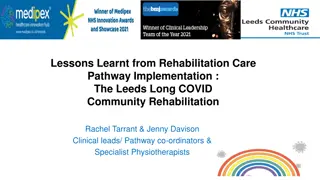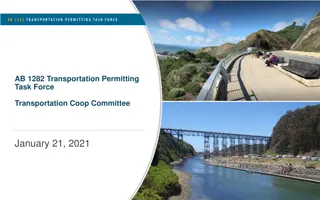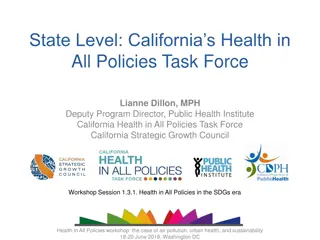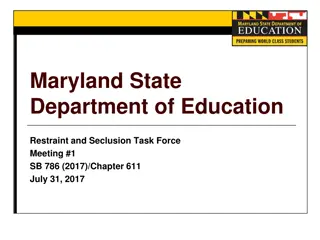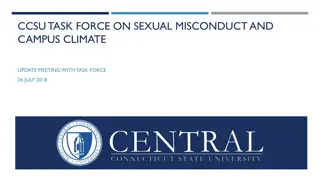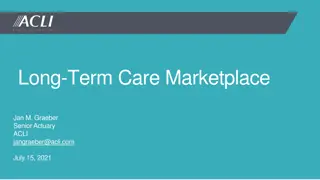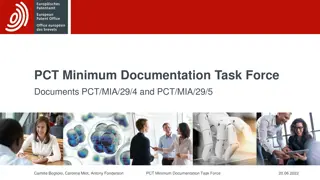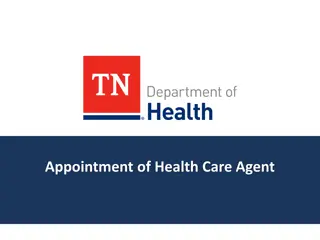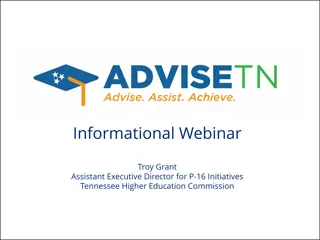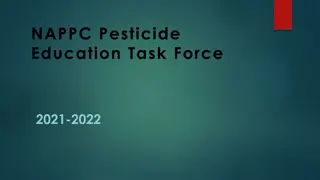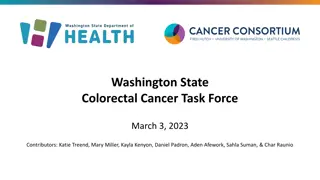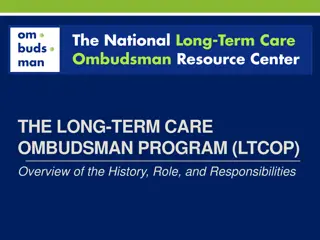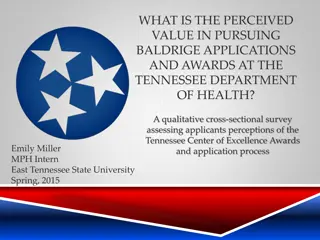Tennessee COVID-19 Long-Term Care Task Force Meeting
The Tennessee COVID-19 Long-Term Care Task Force held a meeting on October 27, 2020, focusing on topics such as data utilization, LTC visitation guidance, effective communication strategies, and key priorities in long-term care facilities regarding COVID-19. The task force aims to collaborate with stakeholders and refine policies to minimize the spread and impact of COVID-19 in healthcare systems.
Download Presentation

Please find below an Image/Link to download the presentation.
The content on the website is provided AS IS for your information and personal use only. It may not be sold, licensed, or shared on other websites without obtaining consent from the author.If you encounter any issues during the download, it is possible that the publisher has removed the file from their server.
You are allowed to download the files provided on this website for personal or commercial use, subject to the condition that they are used lawfully. All files are the property of their respective owners.
The content on the website is provided AS IS for your information and personal use only. It may not be sold, licensed, or shared on other websites without obtaining consent from the author.
E N D
Presentation Transcript
Tennessee COVID-19 Long Term Care Task Force October 27, 2020 10:00 AM CT
Agenda Time Activity Facilitator 10:00 -10:10 a.m. Welcome & Introductions Brent Culberson, Assistant Commissioner, Licensure & Regulation, Chair 10:10 -10:25 a.m. Data and Utilizing COVID-19 Website Mary- Margaret Fill, Deputy State Epidemiologist 10:25 -10:35 a.m. LTC Visitation Guidance: Compassionate Care and Essential Caregivers Caroline Tippens, Senior Associate General Counsel, Office of General Counsel 10:35 -10:50 a.m. LTC Visitation Guidance: Group Discussion Brent Culberson, Assistant Commissioner, Licensure & Regulation, Chair 10:50 - 11:00 a.m. Enhancing Effective Communication with Residents, Families, and Frontline Staff Brent Culberson, Assistant Commissioner, Licensure & Regulation, Chair Sally Pitt, Director, Office of Patient Care Advocacy, Co-Chair 11:00- 11:10 a.m. Subcommittees: Discussion Sally Pitt, Director, Office of Patient Care Advocacy, Co-Chair 11:10-11:25 a.m. General Discussion Brent Culberson, Assistant Commissioner, Licensure & Regulation, Chair 11:25-11:30 a.m. Next Steps and Closing Remarks Brent Culberson, Assistant Commissioner, Licensure & Regulation, Chair
Charge for the COVID-19 LTC Task Force Purpose Engage state, local and community stakeholders and state government to establish a formal structure for collaboration in the conceptualization and implementation of policies and strategies to minimize the spread and impact of COVID-19 in long term care facilities and health care systems. Objectives Monitor the safety and effectiveness of the expanded visitation and activity guidelines and refine them, as necessary. Identify emerging issues to create visibility and focus on key priorities across the long-term care system.
Data: Utilizing COVID-19 Websites
COVID-19 Visitation Guidance: Compassionate Care and Essential Caregivers
Compassionate Care and Essential Caregivers Defining compassionate care visitation situations
CMS Guidance: Compassionate Care Visitation March 13, 2020: CMS guidance allows visitors in nursing facilities only in compassionate care situations. The guidance gives one example of a compassionate care situation an end-of-life situation. Reference: https://www.cms.gov/files/document/3-13-2020-nursing-home-guidance-covid-19.pdf
CMS Guidance: Compassionate Care Visitation Continued June 23, 2020: CMS clarifies provisions for compassionate care situations. It is allowed for more than just end-of-life situations, but should not be allowed routinely, and should be governed by local authorities and managers. Facilities are encouraged to consult with state leadership, families, and long-term care ombudsman, to help determine if a visit should be conducted for compassionate care. Visits should not be routine and allowed on a limited basis as an exception to restricting visitation. Reference: https://www.cms.gov/files/document/covid-visitation-nursing-home-residents.pdf
CMS Guidance: Compassionate Care Visitation Continued Examples of compassionate care situations: A resident who was living with their family before recently being admitted to a nursing home. Allowing someone to visit a resident whose friend or family member recently passed away. Reference: https://www.cms.gov/files/document/covid-visitation-nursing-home-residents.pdf
Governor Lees Executive Order: Visitation Guidance May 22, 2020: Nursing home and long-term care facility visitation restrictions were initially implemented in Executive Order #38. No guidance specific to compassionate care visitation was issued. Instead, the term end of life care was used. The Facility determines in its judgment that: (1) the visit involves the provision of critical assistance to a Resident; or (2) the visit is to a Resident receiving end-of-life care. (Emphasis added.) Amendments: Executive Order #49 was issued on June 12, 2020 and deleted paragraph 6 in its entirety. Executive Order #50 was issued on June 29, 2020 which extended the provisions of Executive Order #49 through August 29, 2020. References: https://publications.tnsosfiles.com/pub/execorders/exec-orders-lee38.pdf; https://publications.tnsosfiles.com/pub/execorders/exec-orders-lee49.pdf ; https://publications.tnsosfiles.com/pub/execorders/exec-orders-lee50.pdf
Tennessee Department of Health Guidance: Compassionate Care Visitation June 15, 2020 ( updated): Tennessee Department of Health s COVID-19 Long- Term Care Facility Guidance: No guidance was issued specifically regarding compassionate care visitation. Persons should not visit a Resident in a Facility unless: The Facility determines that the visit: 1. (A) Involves accommodations for support for Residents with disabilities, the provision of critical assistance to a Resident, or religiousexercise; or (B) Is to a Resident receiving end-of- life care. The phrase end-of-life care was used in Executive Order #38. Reference: https://www.tn.gov/content/dam/tn/health/documents/cedep/novel- coronavirus/LTCF_Visitation.pdf
Essential Caregivers LTCF Visitation Guidance September 17, 2020 Essential Caregivers Essential caregivers (EC) are defined by designating a family member or guardian who, prior to visitation restrictions, was regularly engaged with the resident in activities of daily living (bathing, feeding, clothing, etc.) Essential caregiving visitation includes the following: Visitation should be scheduled with time restrictions. Each resident may have up to five (5) individuals designated as an EC although no more than two (2) at a time can visit per resident. ECs should be screened before entry into the facility including temperature checks and proper hand sanitization. Residents and ECs should wear a face covering and maintain physical distancing from other residents and staff. ECs are subject to the regular testing required of the staff (see testing frequency table below as established by CMS Rules). This could be accomplished by: EC has negative PCR test collected within previous 72 hours OR EC has negative onsite point-of-care test at the facility. Reference: https://www.tn.gov/content/dam/tn/health/documents/cedep/novel- coronavirus/LTCF%20Guidelines_Visitation.pdf
Essential Caregivers State LTCF Visitation Guidance Table 2: Routine Testing Intervals Vary by Community COVID Table 2: Routine Testing Intervals Vary by Community COVID- -19 Activity Level Community COVID Community COVID- -19 19 Activity Activity Low Low <5% <5% Medium Medium 5% 5% - - 10% 10% High High >10% >10% *This frequency presumes availability of Point of Care testing on-site at the nursing home or where off- site testing turnaround time is <48 hours. 19 Activity Level County Positivity Rate in the past week County Positivity Rate in the past week M Minimum Testing inimum Testing Frequency Frequency Once a month Once a month Once a week* Once a week* Twice a week* Twice a week* Reference: https://www.tn.gov/content/dam/tn/health/documents/cedep/novel- coronavirus/LTCF%20Guidelines_Visitation.pdf
CMS QSO-20-39-NH September 17, 2020 Compassionate Care Visits While end-of-life situations have been used as examples of compassionate care situations, the term compassionate care situations does not exclusively refer to end-of-life situations. Examples of other types of compassionate care situations include, but are not limited to: A resident, who was living with their family before recently being admitted to a nursing home, is struggling with the change in environment and lack of physical family support. A resident who is grieving after a friend or family member recently passed away. A resident who needs cueing and encouragement with eating or drinking, previously provided by family and/or caregiver(s), is experiencing weight loss or dehydration. A resident, who used to talk and interact with others, is experiencing emotional distress, seldom speaking, or crying more frequently (when the resident had rarely cried in the past). Allowing a visit in these situations would be consistent with the intent of, compassionate care situations.
CMS QSO-20-39-NH Continued Also, in addition to family members, compassionate care visits can be conducted by any individual that can meet the resident s needs, such as clergy or lay persons offering religious and spiritual support. Furthermore, the above list is not an exhaustive list as there may be other compassionate care situations not included. Lastly, at all times, visits should be conducted using social distancing; however, if during a compassionate care visit, a visitor and facility identify a way to allow for personal contact, it should only be done following all appropriate infection prevention guidelines, and for a limited amount of time. Through a person-centered approach, facilities should work with residents, families, caregivers, resident representatives, and the Ombudsman program to identify the need for compassionate care visits. Reference: https://www.cms.gov/files/document/qso-20-39-nh.pdf
CMS QSO-20-39-NH discussion on essential caregivers CMS QSO 20-39-NH stated the following regarding essential caregivers: We understand that some states or facilities have designated categories of visitors, such as essential caregivers, based on their visit history or resident designation. CMS does not distinguish between these types of visitors and other visitors. Using a person-centered approach when applying this guidance should cover all types of visitors, including those who have been categorized as essential caregivers. As such, essential caregivers are only recognized in state licensed only facilities such as assisted care living facilities and residential homes for the aged. This means that assisted care living facilities and residential homes for the aged must test essential caregivers in accordance with the testing schedule referenced in Slide 8.
Group Discussion: LTC Visitation Guidance
Enhancing Effective Communication with Residents, Families and Frontline Staff
Subcommittees Staffing/Delivery of Care Visitation Transitions of Care Mental Health
Resources Tennessee COVID-19 LTCF Visitation Guidelines ( 9/17/20) Tennessee COVID-19 LTCF Activities and Dining Guidelines (9/17/20) Centers for Medicare and Medicaid Services COVID-19 Nursing Home Visitation Guidance (9/17/20) Tennessee Department of Health COVID-19 Information Office of the Governor COVID-19 Information and Resources
Contact Us Brent Culberson | Assistant Commissioner Division of Health Licensure and Regulation Brent.Culberson@tn.gov 615-741-6257 Sally Pitt | Director Office of Patient Care Advocacy Sally.Pitt@tn.gov 615-741-5879
